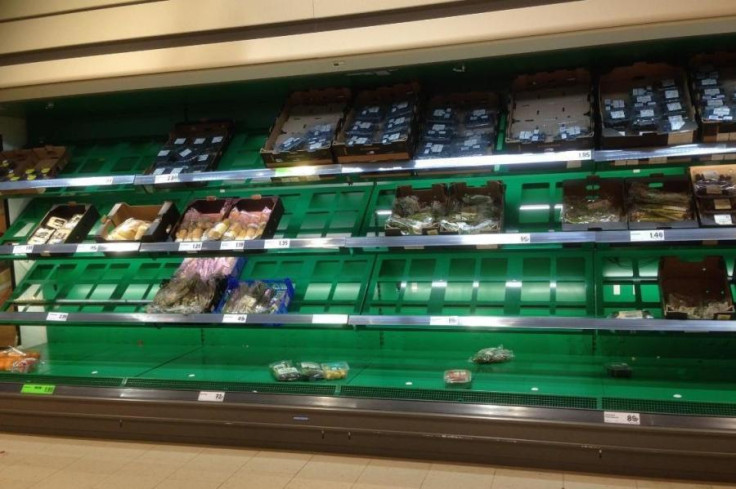Crisis in agricultural goods' availability as snow storm hits the UK in March
The shortage in agricultural goods impacting the UK is drifting to a harsh scenario as a result of the weather condition and supermarkets' policies in attaining supply.

The shortage in agricultural goods that are impacting the UK is drifting towards a much worst scenario as a result of the weather condition and the supermarket's policy in attaining supply.
The storm that led to school closures in Wales, postponed flights in Bristol and disrupted railway lines in London and Birmingham, has caused fruit and veggie shortages across the UK, with the Met Office warning the possible chaos is a "risk to life".
Coupled with this, the shortage in the food supply is not only restricted to the fluky weather in the UK, but as we have previously reported, bad weather in Spain and North Africa has had its effects as well.
When speaking to the Guardian, Leon's co-founder blamed Britain's "weird supermarket culture" for the empty fruit and veggie shelves that continue to span the UK markets.
The issue got to the point that supermarkets are restricting consumers to a certain number of fruits and veggies while grocery shopping.
Morrisons has announced limits of two an item on packs of tomatoes, cucumbers, lettuce and peppers, while Asda is restricting shoppers to three items each on eight fresh produce lines – including broccoli, cauliflower, raspberries and lettuces.
Not to mention, Tesco and Aldi are following in the footsteps of the aforementioned supermarkets. Unfortunately, if the status quo continues in this fashion, this wouldn't even be the peak of the current crisis.
In addition, the supermarkets' strategy for supply is restricted to narrow-scaled contracts. Supermarkets have followed a light-pocket strategy on themselves that consists of making contracts with local farmers for fixed prices on the produce.
Dimbleby further stated that the "fixed price contracts" restrict growers who would rather sell their produce to Europe for higher prices when there is a deficiency in the supply.
This goes as well for the imports. Described as "cost-effective", Gary Barraco claims that this "Overreliance on a single or limited supply base" is side-tracking to cause a risk in the UK's supply chain.
However, a recent tweet by a greengrocer in Llandudno, Tatws Trading, might have added insult to injury.
Surely the #Supermarket buyers bosses etc must be embarrassed with empty shelves when us little #Independents have got produce literally coming from everywhere 💪💪💪💪💪💪💪💪💪💪💪😂😂😂😂😂😂😂😂😂😂😂😂😂😂love it #shoplocal pic.twitter.com/VOakmMMlop
— Tatws Trading 🏴🏴 (@TatwsTrading) March 2, 2023
This tweet ultimately shows that there isn't a shortage in the supply, the issue is with supermarkets' plan of action that fails to stack itself with the needed produce.
Bob Amato, the manager of Amato Food Products, a wholesaler for restaurants and catering businesses, spoke with the Manchester Evening News, commenting that food supplies are available at local greengrocers, but they're just pricey.
Bob added that the supermarkets just don't want to pay to fill their shelves, it's more of an issue with having to pay more rather than being short in agricultural goods.
Consequently, Gary Barraco, Assistant Vice President, Product Marketing at e2open, urged supermarkets to strike a finer balance between local and imported produce to mitigate any future uncertainties in produce availability and adverse weather conditions.
Adding to that, Barraco suggests that it would be wiser for retailers to reevaluate their foreign base of suppliers and move from the "cost-first strategy" to a "security-first approach".
Not only this but to ensure availability in the longer run, Barraco proposes using an "intelligent supply chain platform" or "modern technology solutions" to foretell future supply needs.
With this, Barraco added, organisations would widen their circle of suppliers, or consider a proper act if any issue or shortage occurred, as bad weather would affect the imports from any country or a possible reduced harvest in any region in the UK.
The benefit of this suggestion is that it guarantees the obtainability of produce without harming the consumers' pockets, and in a short period of time.
By and large, the snow wave has just uncovered that the food supply chain in the UK needs certain reassessment as the prices are getting higher and the shelves go empty.
© Copyright IBTimes 2025. All rights reserved.





















